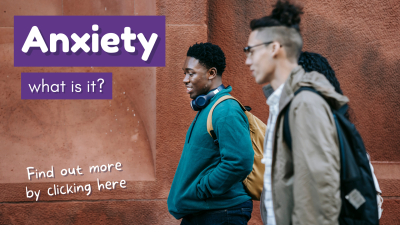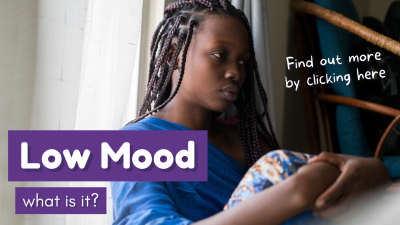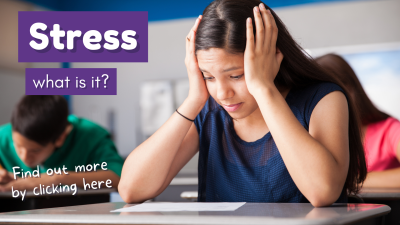I feel worried about a friend

A friend in need is a friend indeed!
Have you noticed a change in a friend’s behaviour? Maybe they have revealed to you that they are struggling with their feelings. If you don’t understand their problem and haven’t been through it yourself, you may be left feeling helpless or worried about your friend.
Scroll down for tips on what you can do, what you can say, and how to be a good listener.
What can I do?
Sometimes when people open up to us, it is hard to know what to say or how to respond. Even though you may not have experienced what your friend is going through, there are still ways to support them. Scroll down to learn how.


Educate Yourself
If you don’t know much about what your friend is going through, educate yourself on the issue. We have created modules about feelings young people commonly struggle with so you can learn about them, how to recognise them, and what to do about them.
Anxiety
We all get worried from time to time, but sometimes this starts to affect our day to day lives.
Anxiety is a feeling of unease that can affect your friend a little or a lot. It is our body's way of dealing with situations that feel dangerous.
Learn more about anxiety here.


Low Mood
It's OK not to feel happy all the time, but if your friend is feeling sad most of the time it can be really hard for them to cope.
Everyone's mood goes up and down. Lots of different things can cause this, like hormones, life events, relationships and stress.
Low mood means that your friend is feeling sad. This could last for a short or long time and can affect their mind and body in different ways.
Learn more about low mood here.
Stress
Stress is not just in someone's head. If you're friend is under a lot of stress it can cause physical changes in their body and changes in behaviour. Stress is actually designed to help us manage threats or difficulties and sometimes a little stress is helpful. For example, when sitting an exam, but it's only helpful when you can manage it.
Learn more about stress here.
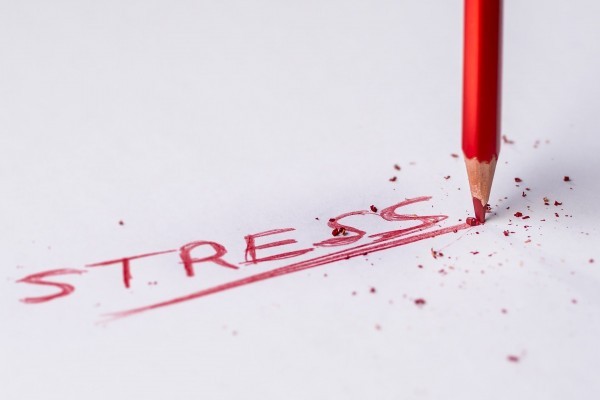

Low Self-Esteem
Self-esteem- what does that even mean?! Self-esteem is how we feel about ourselves. If we feel great about who we are and how we look then we have healthy self-esteem. If we don’t feel good about ourselves, we have unhealthy self-esteem.
If your friend is feeling unconfident, they may be struggling with their self-esteem.
Learn more about self-esteem here.
Anger
Anger is an emotion that everyone feels. It’s normal to feel angry from time to time and this can happen because of something that’s happened or the way we have been treated.
Sometimes feeling angry is a good thing. It can help to keep us safe, work out when something is not good for us or help us to change and grow. It can become a problem when it makes you or others around you feel bad or unsafe.
Learn more about anger here.
Didn’t find what you were looking for? Have a look through all of our modules on our Feelings page.


What resources can I share with them?
Educating yourself is a great way to show support. However, you don’t have to do it all yourself! There are many services and resources that can help a friend in need with a variety of mental health issues.
You can share the e-wellbeing modules with them if they would like to try the modules themselves.
If your friend is in crisis and needs immediate support, you can Get Help Now for them.
Your friend can also search for local mental health services in their area here.
And if your friend lives in Brighton & Hove, the Where To Go For website is a helpful platform with a range of services listed for young people.
What can I say?
Connecting with your friend when they are going through something is a great way to show them you care, and to support them. But sometimes, there are things that we might think are being helpful but could actually be harmful, or not the best way to show support.
Here are some helpful resources on the misconceptions and myths about mental health issues, things to say and things NOT to say.

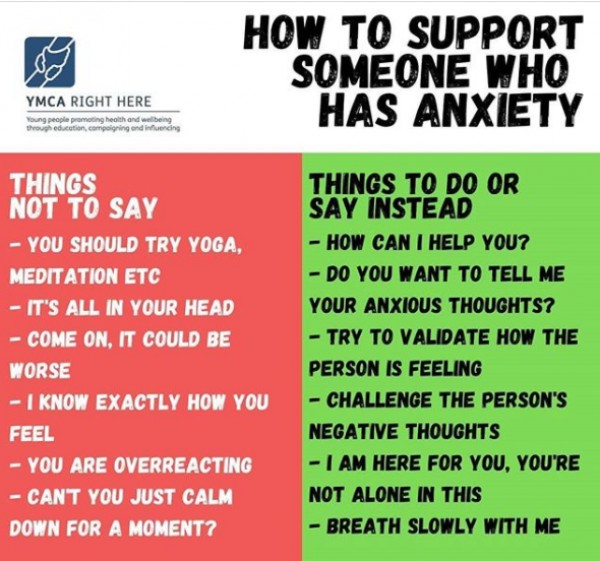
I am here for you
If your friend is feeling anxious and you're not sure what to do, here are some tips on how you can support them.
Find more tips like this by checking out our Anxiety feelings module.
Showing Up
Sometimes a friend might be trying to ask for help but is struggling to find the words.
We might tell ourselves it will be best to send a sweet text, leaving it up to them to ask for more help if needed, so we don't 'overstep.'
Instead try to make it easy for your friend to open up to you. You could boldly show up for your friend in ways that truly say 'I am here for you' such as bringing them pizza and spending an evening talking.
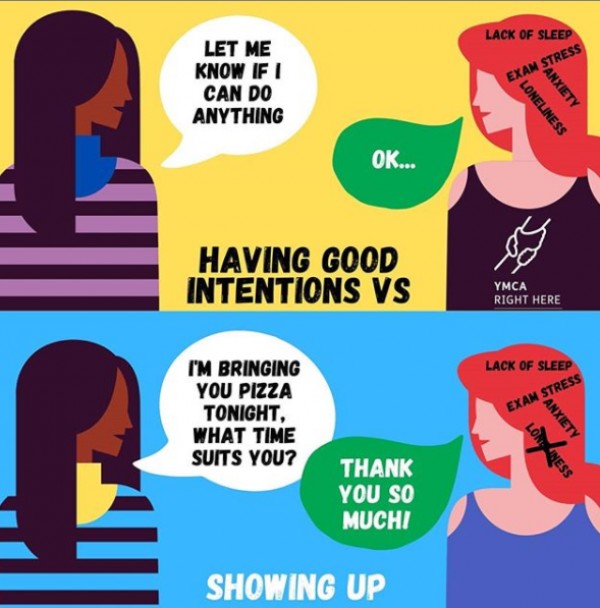
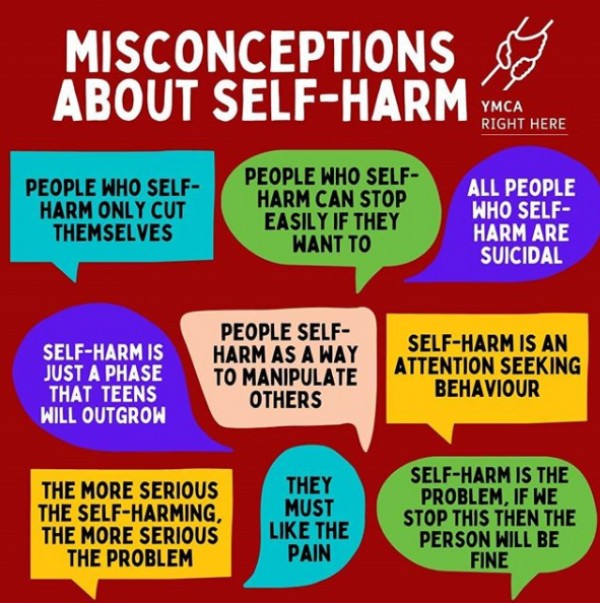
Misconceptions about Self-Harm
There are common misconceptions about people who self-harm.If your friend has revealed to you that they are self-harming, it is important to show them you are there for them and not judge them.
To learn more about why your friend might be self-harming, click on our module here.
If your friend is in crisis and needs immediate support, you can Get Help Now for them.
Your friend can also search for local mental health services in their area here.
Supporting a friend in an unhealthy relationship
If someone you care about is in a relationship that seems unhealthy, it can be difficult to know what to do. You may be worried about their safety, but feel unsure about starting a conversation with them about this.
In this video, YMCA WiSE Ambassador Teddy shares their advice about how you can support a friend, while also looking after your own wellbeing.

How to be a good listener
Showing support for your friend is not always about what you say. If a friend is struggling with their emotional wellbeing, they may want to talk to someone and feel listened to. Or they may just want to know that you are there for them. A really good way to connect with your friend when they are talking to you about feelings is to be an active and empathetic listener.


What is empathy?
Empathy, unlike sympathy, does not mean we agree with the other person or have had the same experience and the same point of view. Instead, showing empathy means stepping outside of our normal patterns of thinking and feeling to imagine what it feels like to be the person in front of us.
There are key things we can do to make sure we are being the best listeners we can be.
Step 1: Listen and Look
- Make eye contact and focus on what is being said. Try not to do other activities at the same time, such as checking your phone.
- Use a relaxed body posture. Stay close enough to the person to show you care, but do not touch the person without asking first.


Step 2: Listen quietly
- Listen quietly and allow your friend to speak, without trying to fix their problem. Listening without engaging in problem-solving signals that you are on your friend’s side. This simple gesture validates your friend’s experience.
- Focus on conveying empathy and not on changing the person or their perspective.
Step 3: Ask and Repeat
- Slow down and allow pauses. Distress often increases the speed of our speech and gestures. Some people may need time to think about how to express themselves, so give your friend enough time and don’t pressure them to answer quickly.
- Ask questions. If something is not clear, asking for more detail about it in a friendly and non-judgmental way shows interest and concern.
- Repeat for confirmation. When you repeat what you heard, you reduce the chance of confusion. Give the other person a chance to correct any misunderstanding of what you think you heard.


Get Help
Lastly, its really important for you to practice self-care by taking care of yourself and setting clear boundaries for yourself. If your friend continues to struggle with their emotions, please support them by seeking professional guidance from a trusted adult or using any of the links below:
If your friend is in crisis and needs immediate support, you can Get Help Now for them.
Your friend can also search for local mental health services in their area here.
